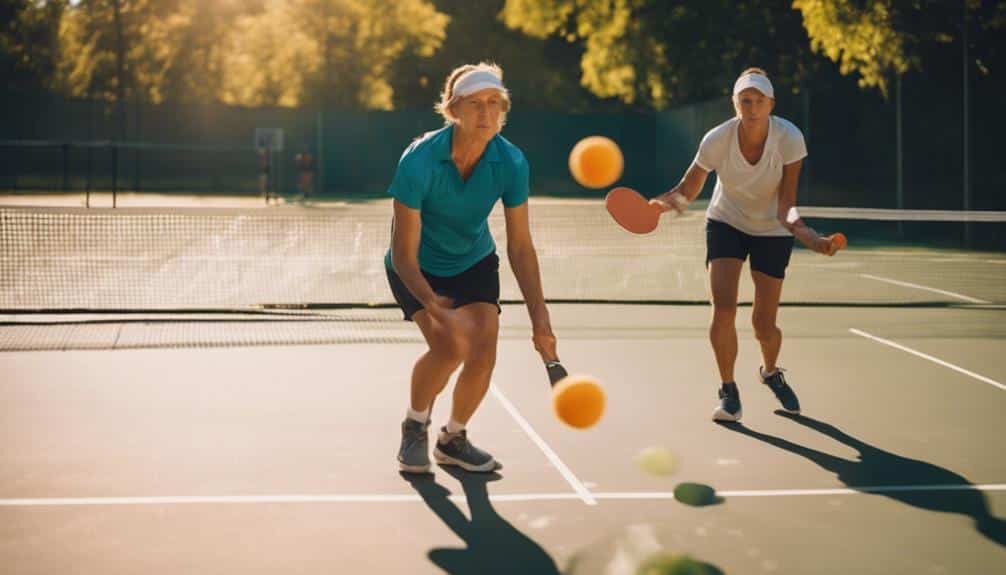Pickleball partnerships are constantly put to the test through shared experiences on the court. I've found that successful duos embrace a growth mindset, focusing on learning from both wins and losses. It's crucial to align expectations with your partner, creating a supportive environment that nurtures improvement. Effective communication and celebrating growth, rather than fixating on outcomes, strengthens team dynamics. Elite players like Janik Sinner demonstrate how losses can be powerful catalysts for development. By reframing defeats as opportunities and engaging in post-game debriefs, partners can identify areas for improvement and develop strategies to overcome challenges. The journey of continuous improvement in pickleball partnerships is both rewarding and multifaceted.
Key Takeaways
- Effective communication is crucial for maintaining a strong partnership during challenging matches.
- Embracing a growth mindset helps partners view losses as learning opportunities rather than failures.
- Aligning expectations and goals before matches strengthens the partnership's resilience under pressure.
- Regular post-game debriefs allow partners to identify areas for improvement and celebrate progress.
- Developing shared strategies to overcome setbacks fosters a supportive team dynamic in high-stress situations.
Partner Expectations in Pickleball
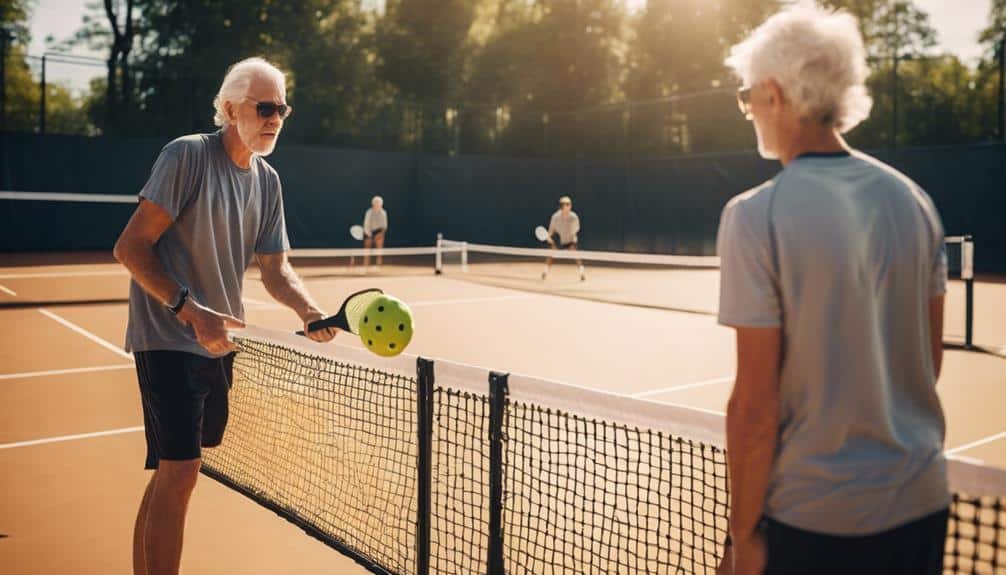
Successful pickleball partnerships hinge on a set of shared expectations that foster growth, learning, and resilience.
As I've discussed in my Podcast highlights, it's crucial to approach games with a 'win or learn' mindset. This perspective allows us to celebrate both victories and losses, recognizing that each outcome presents an opportunity for improvement.
I've found that focusing on the journey rather than just the results helps us reframe losses as valuable learning experiences.
In our Game Studies, we emphasize the importance of using setbacks to strengthen our skills and strategy.
By embracing this growth-oriented approach, we're better equipped to handle challenges on and off the court. Remember, pickleball isn't just about winning; it's about continuous improvement and enjoying the process.
When we align our expectations with our partner, we create a supportive environment that nurtures our shared passion for the game.
Learning From Losses
Drawing inspiration from elite athletes, we can transform our losses in pickleball into powerful catalysts for growth and improvement.
As a 5.0 rated Senior Pro Pickleball Player with a background in tennis, I've learned that embracing losses is crucial for development. Take Janik Sinner's perspective after his French Open defeat – he saw it as an opportunity to enhance his game. We can apply this mindset to our pickleball journey.
In our YouTube video on this topic, I discuss how reframing losses can lead to significant progress. Instead of dwelling on defeat, focus on what you've learned and how you can improve.
This approach not only strengthens your skills but also fosters a sense of camaraderie within the pickleball community. By adopting this growth mindset, we're not just becoming better players; we're contributing to a supportive, learning-focused environment for all.
The Win-or-Learn Mindset
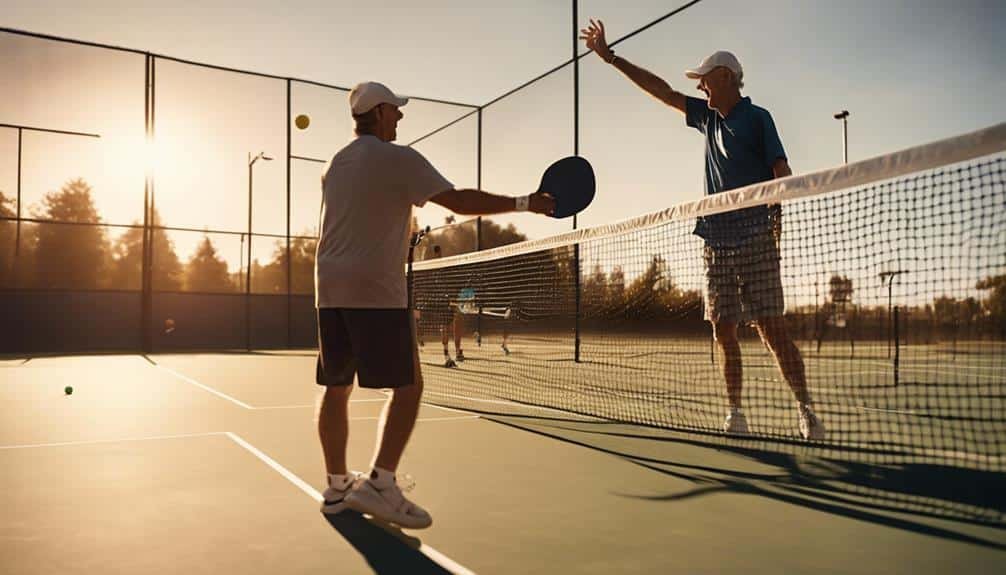
The win-or-learn mindset represents a transformative approach to pickleball partnerships, encouraging players to view every match as an opportunity for growth. I've found that adopting this perspective, like Janik Sinner did after his French Open loss, can significantly impact a player's development.
It's about reframing our experiences, whether we win or lose, as chances to improve our game.
As Tony Roig, a 5.0 rated Senior Pro Pickleball Player, often emphasizes, celebrating both wins and losses is crucial.
This mindset helps us focus on the journey of improvement rather than fixating on outcomes.
By embracing this approach, we can build stronger partnerships, as both players understand that every game contributes to their collective growth.
It's not about avoiding losses, but about learning from them and coming back stronger.
French Open Lessons
Janik Sinner's response to his French Open semi-final loss against Carlos Alcaraz offers a powerful lesson for pickleball players on embracing a growth mindset.
Instead of dwelling on the defeat, Sinner reframed the experience as an opportunity to learn and improve. He's now focused on working on his game to challenge Alcaraz in their next encounter.
This attitude exemplifies the growth mindset we should all strive for in pickleball. It's about viewing losses not as failures, but as chances to grow.
The respectful rivalry between Sinner and Alcaraz also demonstrates excellent sportsmanship, something we can all appreciate in our pickleball community.
As players, we can draw inspiration from this French Open moment. By adopting a similar mindset, we can turn our own challenges on the court into stepping stones for improvement, fostering a more positive and growth-oriented pickleball experience.
Celebrating Growth and Improvement
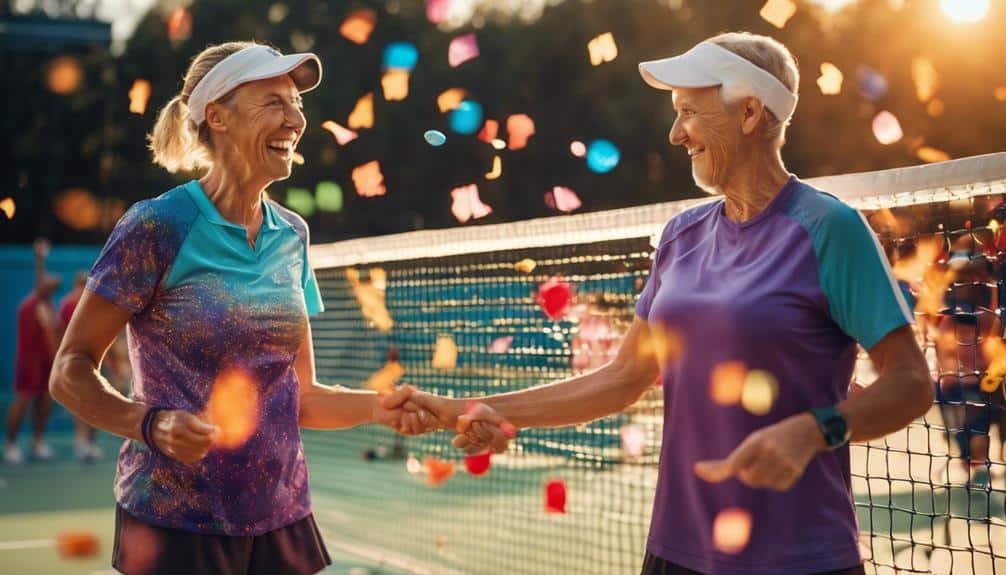
In pickleball partnerships, celebrating both wins and losses is crucial for fostering growth and maintaining a positive team dynamic. As a player and coach, I've learned that embracing the journey of improvement is far more valuable than fixating on outcomes.
The recent French Open semi-final between Janik Sinner and Carlos Alcaraz exemplifies this mindset, reminding us of the importance of reframing losses as learning opportunities.
To celebrate growth and improvement in your pickleball partnerships, consider these practices:
- Host a post-game debrief to discuss key learnings
- Create a team ritual to acknowledge personal bests
- Keep a shared journal of progress and milestones
- Plan regular skills workshops to focus on improvement
Sportsmanship in Competitive Play
While celebrating growth is vital, sportsmanship forms the backbone of competitive pickleball, shaping the character of players and the spirit of the game.
I've witnessed firsthand how good sportsmanship can elevate the entire experience, regardless of the outcome.
It's not just about following rules; it's about respecting opponents, acknowledging their skills, and maintaining integrity.
Even in the heat of competition, I remind myself that we're all here because of our shared love for pickleball.
This mindset helps me stay focused on my personal interests in the game rather than getting caught up in wins and losses.
Just as we respect a website's Cookie Policy to ensure a fair online experience, we must respect the unwritten rules of sportsmanship to create a positive environment for all players.
Reframing Defeat
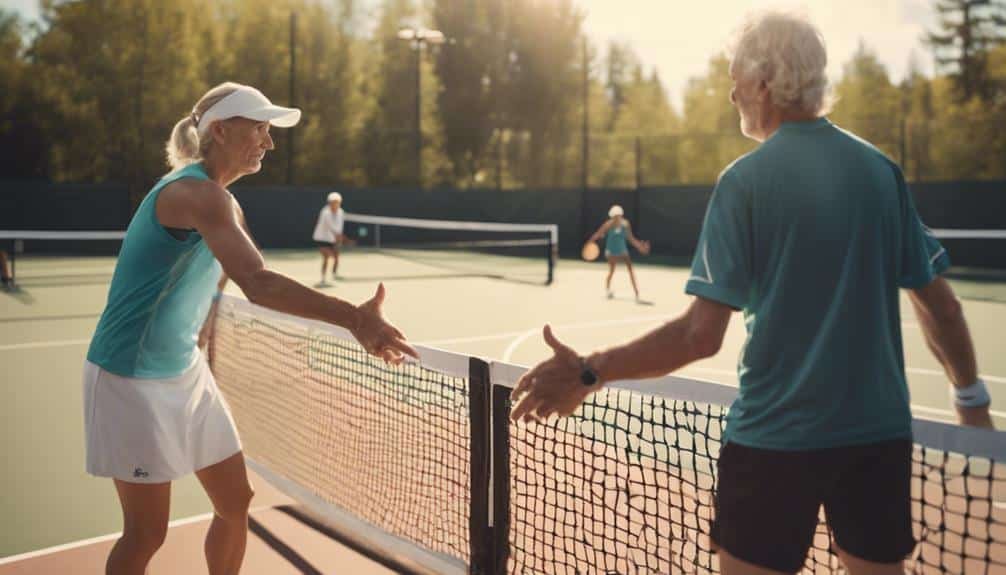
Defeat often feels like a setback, but reframing it as a learning opportunity can transform our pickleball journey.
In my Game Studies, I've observed that players who adopt this mindset tend to progress faster and enjoy the sport more.
By viewing losses as inspirational moments, we can:
- Picture ourselves analyzing gameplay footage, identifying areas for improvement
- Imagine practicing specific shots that challenged us during the match
- Visualize discussing strategy adjustments with our partner
- Envision ourselves returning to the court with renewed determination
This approach aligns with the growth mindset exemplified by professional athletes like Janik Sinner.
When we embrace defeat as a chance to learn and grow, we're not just improving our skills; we're fostering a resilient spirit that will serve us well both on and off the court.
Resources for Skill Development
To elevate your pickleball game, I've curated a selection of valuable resources designed to enhance your skills and strategy.
Our podcast episode 196 offers insights into partner expectations and lessons from professional tennis, which you can also find as a YouTube video on our channel. For those looking to dive deeper, I recommend our Pickleball System Class and Beat the Bangers course. These comprehensive programs will help you refine your technique and develop winning strategies.
Our Game Studies sessions provide an opportunity to analyze matches and improve your tactical approach. If you're preparing for competitions, our Tournament Game Plan resource is invaluable.
Professional Insights
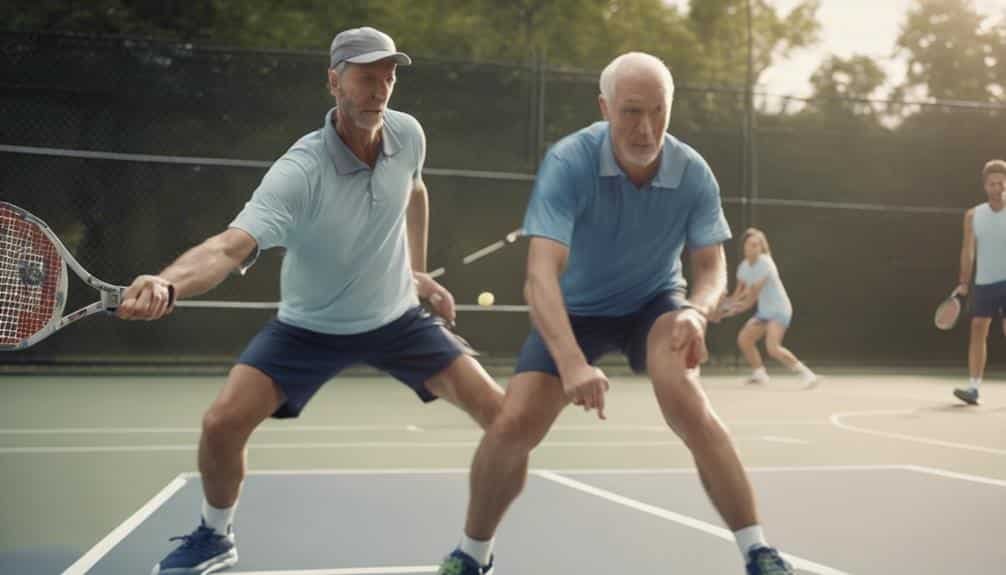
As a professional player and coach, I've gathered valuable insights that complement these learning resources and can significantly impact your pickleball performance.
Drawing from my experience, I've observed how partnerships evolve and thrive. Tony Roig's approach to partner expectations aligns with what I've seen in successful teams. The French Open semi-final serves as an inspirational moment, showcasing the power of a growth mindset in competitive sports.
Partners who communicate openly tend to perform better under pressure.
Teams that celebrate both wins and losses foster stronger bonds.
Players who focus on improvement rather than outcomes show consistent growth.
Partnerships built on mutual respect and support often outlast those based solely on skill.
Building Stronger Partnerships
Building stronger partnerships in pickleball requires a combination of skill development, effective communication, and a shared mindset focused on growth and improvement.
I've found that adopting a 'win or learn' approach, as demonstrated by players like Janik Sinner at the French Open, can significantly enhance team dynamics.
By celebrating both wins and losses, partners can create a supportive environment that fosters continuous improvement.
Engaging in Game Studies together can help partners identify areas for growth and develop strategies to overcome challenges.
It's crucial to reframe losses as opportunities to learn and come back stronger.
By embracing the journey of improvement rather than fixating on outcomes, partnerships can thrive even in the face of setbacks.
Conclusion
I've navigated the choppy waters of pickleball partnerships, and I've learned that success isn't just about skill.
It's about cultivating a growth mindset, embracing challenges, and supporting your partner through wins and losses.
By reframing defeats as learning opportunities and celebrating improvement, we can build stronger partnerships and elevate our game.
Like a well-oiled machine, a partnership built on mutual growth and support will run smoothly, even in the face of fierce competition.

